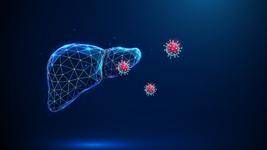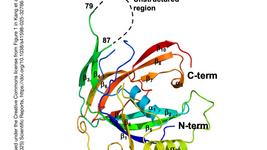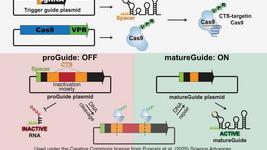CMN Weekly (14 July 2023) - Your Weekly CRISPR Medicine News
By: Karen O'Hanlon Cohrt - Jul. 14, 2023
Top picks
- In an article published in Nature Biomedical Engineering this week, a team of researchers at Yale University unveil MAJESTIC, a brand new gene delivery system based on Sleeping Beauty (SB) transposase delivered by an adeno-associated virus, which encodes an SB transposon that includes the desired transgene. The new technology allows CRISPR-independent, DNA-free and non-lentiviral gene delivery into diverse human cell types with high efficiency and cell viability. MAJESTIC technology has been exclusively licensed to Cellinfinity Bio, which according to a press release, plans to use it to develop novel therapies for a broad range of diseases.
Research
- In an article published earlier this week in ACS Central Science, scientists at Verve Therapeutics report a high-fidelity, top-down mass spectrometry workflow to provide direct and quantitative assessments of highly modified gRNAs. The aim of the work was to advance gRNA characterisation to ensure that the spacer region of any gRNA is of high fidelity, since it is this which dictates the on-target editing site as well as potential undesired off-target edits.
- Mutations in the Crumbs-homologue-1 (CRB1) gene lead to a spectrum of severe inherited retinal diseases, including retinitis pigmentosa (RP). Establishing genotype-phenotype correlations in CRB1 patients is inherently difficult because of the variability and phenotypic overlap between CRB1-associated diseases. To address this challenge, researchers at various institutes in the U.S. leveraged the potential of induced pluripotent stem cell (iPSC)-derived patient retinal organoids to model CRB1 RP patient phenotypes, and developed a correction strategy for the most prevalent CRB1 mutation (Gly827Val) using CRISPR-Cas9-mediated homology-directed repair. The findings were published in Advances in Experimental Medicine and Biology. In a separate article in the same journal, the authors also report the results of an analysis of the Leiden Open Variation Database to identify CRB1 pathogenic variants correctable with CRISPR base- and prime editing. You can read findings from that study here.
- Earlier this week, scientists in China reported a new small adenine base editor (sABE) with significantly reduced size compared to existing ABEs. The new sABE was generated by subjecting ABE8e to large single deletions in the REC2 and HNH domains of SpCas9, and stacking these deletions to create sABE. The team found that sABE showed higher precision than the original ABE8e, with proximally shifted protospacer adjacent motif (PAM) editing windows (A3- A15), and comparable editing efficiencies to 8e-SaCas9-KKH. The sABE system efficiently generated A-G mutations at disease-relevant loci in human cell lines, and was successfully used to edit the genome of mouse embryos by microinjecting sABE mRNA and sgRNA into zygotes. The findings were published in BMC Biology.
- A team of researchers at Columbia University (U.S.) have added to the prime-editing toolbox, with the development of a new prime editor based on the avian myeloblastosis virus (AMV)-RT, and demonstrated its applicability for the installation of the PRPH2 c.828+1G>A mutation (associated with retinal diseases) in HEK293 cells. Their findings were published today in Advances in Experimental Medicine and Biology.
Industry & clinical
- Caribou Biosciences reported positive clinical data yesterday, from the dose escalation phase of the ongoing CB-010 ANTLER Phase 1 trial in relapsed or refractory B-cell non-Hodgkin lymphoma B-NHL. Amongst the findings, Caribou announced that CB-010 exhibited a 94% overall response rate and 69% complete response (CR) rate, and 44% CR rate at ≥6 months following a single dose of CB-010. CB-010 is Caribou’s most advanced cell therapy candidate and is derived from healthy donor T cells that are edited using the company's proprietary Cas9 chRDNA technology. CB-010 was the first allogeneic CAR-T cell therapy with a CRISPR-mediated PD-1 deletion to be cleared for a clinical trial. You can read more about CB-010 and previous clinical data in a recent clinical trial update here.
- Caribou Biosciences announced yesterday that it has commenced an underwritten public offering of $100 million of shares of its common stock. See press release here for more details.
Reviews
- Familial hypercholesterolemia (FH) is a genetic disorder characterised by elevated levels of low-density lipoprotein cholesterol, which results in a greater risk of developing heart disease. Current therapeutic approaches range from the extensively-used statins to lower blood cholesterol to emerging novel gene therapy and gene-editing strategies. A new review published this week in Frontiers in Molecular Medicine provides an overview of FH disease pathogenesis, the latest updates on available therapies and a critical review of emerging gene therapies.
- CRISPR/Cas-mediated genome editing in mice for the development of drug delivery mechanism. This review focuses on the ways in which CRISPR-Cas9 technology can be used to generate mouse models of human diseases, including knock-in and knock-out methods to model neurological and cardiovascular diseases as well as cancer.
- Advancement in precision diagnosis and therapeutic for triple-negative breast cancer: Harnessing diagnostic potential of CRISPR-cas & engineered CAR T-cells mediated therapeutics. The authors of this review highlight the AKT signaling cascade and the retinoblastoma protein (pRb) regulating cascade as promising targets for novel therapeutic interventions for cancer, based on combinations of therapeutic agents and modern diagnostic tools (nanotheranostics). The authors propose that by targeting AKT by syngergising state-of-the-art gene-editing tools such as CRISPR-Cas with nanomaterials, there is potential to enhance cancer diagnostics significantly.
- Engineered Nanomaterials to Potentiate CRISPR/Cas9 Gene Editing for Cancer Therapy. This review aims to highlight recent advances in non-viral methods to deliver CRISPR reagents, and discusses how these approaches could be potentially used to treat cancers without the concerns surrounding safety and packaging capacity that are associated with viral delivery methods.
- Base editors: development and applications in biomedicine. This review covers recent developments within base editing, summarises their applications in the biomedical field, and discusses future perspectives and challenges for therapeutic applications.
- Clinical Pharmacology and Translational Considerations in the Development of CRISPR-Based Therapies. In this review, scientists at Intellia Therapeutics provide a snapshot of selected topics in clinical pharmacology and translation that has supported the advance of systemically administered in vivo and ex vivo CRISPR-based investigational therapies in the clinic.
Patent news
- If you are following the years-long CRISPR patent dispute, you can get the latest update, released today, here: CVC Appeals PTAB Decision in CRISPR Interference.
Huh, heh, wow
Building a Better Forest Tree With CRISPR Gene Editing. In an article published yesterday in Science, researchers at North Carolina State University report using multiplex CRISPR editing to breed poplar trees with reduced levels of lignin, the major barrier to sustainable production of wood fibers, while improving their wood properties. The findings reveal the potential to make fiber production a greener, cheaper, and more efficient process, for everything from paper to diapers.
News from CRISPR Medicine News
- In a recent proof-of-concept study, researchers at SNIPR Biome and collaborators confirmed the feasibility of using CRISPR-armed phages to selectively target clinically-relevant E. coli strains. Their findings highlight new possibilities in using phage therapy to address the challenges of antibiotic treatments and antibiotic-resistant bacteria. Read more in our latest interview with SNIPR Biome scientists Y. Emre Gencay, Eric van der Helm, and Milan Zdravkovic here.
To get more CRISPR Medicine News delivered to your inbox, sign up to the free weekly CMN Newsletter here.
Tags
CLINICAL TRIALS
IND Enabling
Phase I
Phase II
Phase III
Gastric Cancer and Colorectal Cancer, CRC, (NCT07166263)
Sponsors:
Base Therapeutics (Shanghai) Co., Ltd.
Sponsors:
Base Therapeutics (Shanghai) Co., Ltd.
IND Enabling
Phase I
Phase II
Phase III
Relapsed or Refractory Acute Myeloid Leukemia, AML, (NCT06541444)
Sponsors:
Base Therapeutics (Shanghai) Co., Ltd.
Sponsors:
Base Therapeutics (Shanghai) Co., Ltd.
IND Enabling
Phase I
Phase II
Phase III







